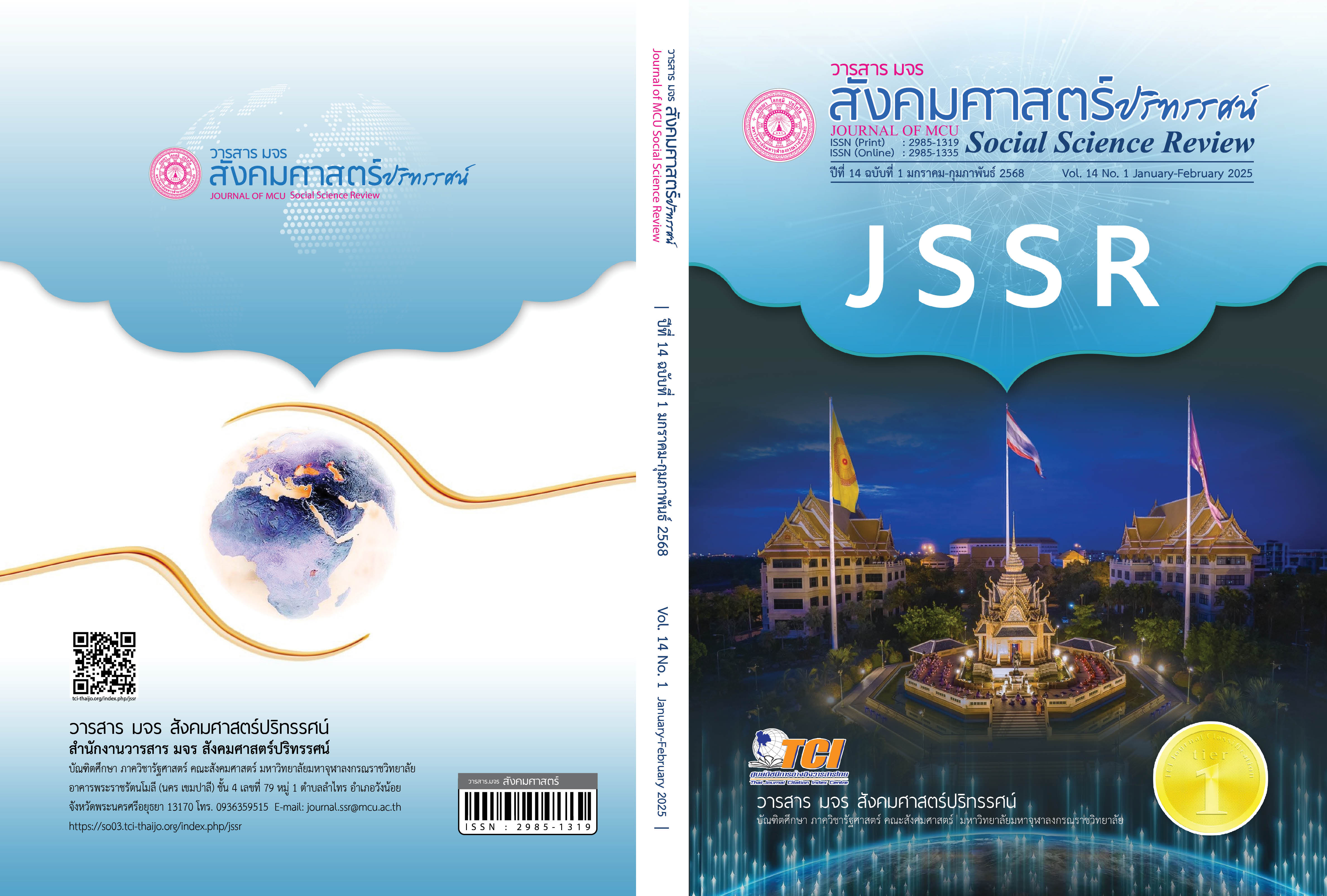การพัฒนาความรอบรู้ในข้อมูลป้อนกลับของนักเรียนชั้นมัธยมศึกษาปีที่ 1 โดยใช้การสอนด้วยวิธีการประเมินโดยเพื่อน
คำสำคัญ:
ความรอบรู้ในข้อมูลป้อนกลับ, ข้อมูลป้อนกลับ, การประเมินโดยเพื่อนบทคัดย่อ
บทความวิจัยครั้งนี้มีวัตถุประสงค์ 1. ศึกษาระดับความรอบรู้ในข้อมูลป้อนกลับของนักเรียน และ 2. เปรียบเทียบความรอบรู้ในข้อมูลป้อนกลับระหว่างนักเรียนที่เรียนโดยใช้วิธีการประเมินโดยเพื่อนและการเรียนแบบปกติ กลุ่มตัวอย่างวิจัย คือ นักเรียนชั้นมัธยมศึกษา
ปีที่ 1 โรงเรียนสุรวิวัฒน์ มหาวิทยาลัยเทคโนโลยีสุรนารี จำนวน 114 คน เครื่องมือที่ใช้ในการวิจัย ได้แก่ แผนการสอนที่ใช้วิธีการประเมินโดยเพื่อน และแบบวัดความรอบรู้ในข้อมูลป้อนกลับ วิเคราะห์ข้อมูลโดยใช้ค่าเฉลี่ย ค่าความเบี่ยงเบนมาตรฐาน การทดสอบทีของตัวอย่างสองกลุ่มที่ไม่เป็นอิสระจากกัน และการทดสอบทีของตัวอย่างสองกลุ่มที่เป็นอิสระจากกัน
ผลการวิจัยพบว่า 1. นักเรียนที่ได้รับการสอนโดยใช้วิธีการประเมินโดยเพื่อนมีความรอบรู้ในข้อมูลป้อนกลับที่สูงขึ้นกว่าก่อนเรียน โดยด้านการประเมินตัดสินคุณภาพงานจากข้อมูลป้อนกลับมีค่าเฉลี่ยสูงที่สุด รองลงมาคือ ด้านการนำข้อมูลป้อนกลับไปปฏิบัติ ขณะที่นักเรียนที่เรียนโดยวิธีปกติมีความรอบรู้ในข้อมูลป้อนกลับด้านการนำข้อมูลป้อนกลับไปปฏิบัติสูงที่สุด รองลงมาคือ ด้านการประเมินตัดสินคุณภาพงานจากข้อมูลป้อนกลับ ทั้งนี้นักเรียนทั้งสองกลุ่มมีความรอบรู้ในข้อมูลป้อนกลับด้านการจัดการกับความรู้สึกต่อข้อมูลป้อนกลับต่ำที่สุดและ2. นักเรียนที่ได้รับการสอนแบบวิธีการประเมินโดยเพื่อนมีความรอบรู้ในข้อมูลป้อนกลับสูงกว่านักเรียนที่เรียนด้วยวิธีการสอนแบบปกติอย่างมีนัยสำคัญทางสถิติที่ระดับ .05 (t(112)=2.900, p=.004) การศึกษานี้บ่งชี้ให้เห็นว่า การประเมินโดยเพื่อนเป็นเครื่องมือที่เป็นประโยชน์สำหรับครูผู้สอนและช่วยพัฒนาให้นักเรียนมีความรอบรู้ในข้อมูลป้อนกลับสำหรับพัฒนากลยุทธ์การเรียนรู้ของนักเรียนให้บรรลุเป้าหมายได้
เอกสารอ้างอิง
พินดา วราสุนันท์. (2558). การพัฒนาผู้เรียนด้วยการให้ข้อมูลย้อนกลับโดยเพื่อน. วารสารมหาวิทยาลัยราชภัฏมหาสารคาม (มนุษยศาสตร์และสังคมศาสตร์), 9(1), 33-40.
สุวพิชญ์ เกษมสุข และกมลวรรณ ตังธนกานนท์. (2561). การเปรียบเทียบพัฒนาการทักษะการทำงานกลุ่มและคุณภาพผลงานของนักเรียนมัธยมศึกษาตอนปลายที่ได้รับข้อมูลป้อนกลับจากการประเมินหลายแหล่งที่แตกต่างกัน. วารสารอิเล็กทรอนิกส์ทางการศึกษา, 13(3), 302-315.
Boud, D. & Molloy, E. (2013). Rethinking models of feedback for learning: The challenge of design. Assessment & Evaluation in Higher Education, 38(6), 698-712.
Carless, D. & Boud, D. (2018). The development of student feedback literacy: Enabling uptake of feedback. Assessment & Evaluation in Higher Education, 43(8), 1315-1325.
Evans, C. (2013). Making sense of assessment feedback in Higher Education. Review of Educational Research, 83(1), 70-120.
Han, Y. & Xu, Y. (2020). The development of student feedback literacy: The influences of teacher feedback on peer feedback. Assessment & Evaluation in Higher Education, 45(5), 680-696.
Hattie, J. & H. Timperley. (2007). The power of feedback. Review of Educational Research, 77(1), 81–112.
Hu, G. & Lam, S. T. E. (2010). Issues of cultural appropriateness and pedagogical efficacy: Exploring peer review in a second language writing class. Instructional Science, 38(4), 371-394.
Ketonen, L. et al. (2020). The development of secondary students’ feedback literacy: Peer assessment as an intervention. The Journal of Educational Research, 113(6), 407-417.
Nicol, D. et al. (2014). Rethinking feedback practices in Higher Education: A peer review perspective. Assessment & Evaluation in Higher Education, 39(1), 102-122.
Nicol, D. J. & Macfarlane-Dick, D. (2006). Formative assessment and self-regulated learning: A model and seven principles of good feedback practice. Studies in Higher Education, 31(2), 199–218.
Poulos, A. & Mahony, M. J. (2008). Effectiveness of feedback: the students’ perspective. Assessment & Evaluation in Higher Education, 33(2), 143-154.
Price, M. et al. (2011). Feedback: Focusing attention on engagement. Studies in Higher Education, 36(8), 879-896.
Sadler, D. R. (1989). Formative assessment and the design of instructional systems. Instructional Science, 18(2), 119–144.
Sutton, P. (2012). Conceptualizing Feedback Literacy: Knowing, being, and acting. Innovations in Education and Teaching International, 49(1), 31-40.
Topping, K. J. (1998). Peer assessment between students in colleges and universities. Review of Educational Research, 68(3), 249-276.
Winstone, N. et al. (2017). It’d be useful, but I wouldn’t use it: Barriers to university students’ feedback seeking and recipience. Studies in Higher Education, 42(11), 2026-2041.
Zhu, Q. & Carless, D. (2018). Dialogue within peer feedback processes: Clarification and negotiation of meaning. Higher Education Research & Development, 37(4), 883-897.
ดาวน์โหลด
เผยแพร่แล้ว
รูปแบบการอ้างอิง
ฉบับ
ประเภทบทความ
สัญญาอนุญาต
ลิขสิทธิ์ (c) 2025 วารสาร มจร สังคมศาสตร์ปริทรรศน์

อนุญาตภายใต้เงื่อนไข Creative Commons Attribution-NonCommercial-NoDerivatives 4.0 International License.
เพื่อให้เป็นไปตามกฎหมายลิขสิทธิ์ ผู้นิพนธ์ทุกท่านต้องลงลายมือชื่อในแบบฟอร์มใบมอบลิขสิทธิ์บทความให้แก่วารสารฯ พร้อมกับบทความต้นฉบับที่ได้แก้ไขครั้งสุดท้าย นอกจากนี้ ผู้นิพนธ์ทุกท่านต้องยืนยันว่าบทความต้นฉบับที่ส่งมาตีพิมพ์นั้น ได้ส่งมาตีพิมพ์เฉพาะในวารสาร มจร สังคมศาสตร์ปริทรรศน์ เพียงแห่งเดียวเท่านั้น หากมีการใช้ภาพหรือตารางหรือเนื้อหาอื่นๆ ของผู้นิพนธ์อื่นที่ปรากฏในสิ่งตีพิมพ์อื่นมาแล้ว ผู้นิพนธ์ต้องขออนุญาตเจ้าของลิขสิทธิ์ก่อน พร้อมทั้งแสดงหนังสือที่ได้รับการยินยอมต่อบรรณาธิการ ก่อนที่บทความจะได้รับการตีพิมพ์ หากไม่เป็นไปตามข้อกำหนดเบื้องต้น ทางวารสารจะถอดบทความของท่านออกโดยไม่มีข้อยกเว้นใดๆ ทั้งสิ้น





